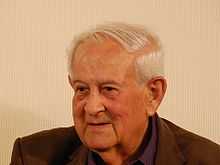Hanoch Bartov

Hanoch Bartov (Hebrew: חנוך ברטוב, born 13 August 1926) is an Israeli author and journalist.
Biography
Hanoch Helfgott (Bartov) was born in Petah Tikva in 1926, a year after his parents immigrated from Poland.[1] He attended a religious school and then the Ahad Haam gymnasium.[2] After working in diamond polishing and welding for two years, he enlisted in 1943, at the age of 17, in the Palestine Regiment of the British Army. He spent three years in the Jewish Brigade, first in Palestine and then in Italy and the Netherlands, where he served as a medic, caring for Holocaust survivors in DP camps.
After World War II, Bartov studied Jewish and general history at the Hebrew University of Jerusalem. During the War of Independence he served in field army units and the Israel Defense Forces in Jerusalem. He lived for four years on Kibbutz Ein Hahoresh, working as a farmhand and a teacher.[3] From 1966 to 1968, Bartov served as a cultural advisor in the Israeli embassy in London.
Today Bartov lives in a suburb of Tel Aviv.
Literary career
Bartov published his first story in 1945, when he was a 19-year old soldier in Europe.[3] In his writing, as a journalist and novelist, Bartov describes his first contacts with survivors of the Holocaust. The Brigade is a fictionalized account of the operation of the Jewish Brigade.[1]
Awards
Among the various prizes received by Bartov for his work are the following:
- In 1985, the Bialik Prize for literature;[4]
- In 2006, the Agnon Prize;[5]
- In 2010, the Israel Prize, for literature.[3][5][6]
Books published in English
- The Brigade (1967), translation of Pitzei Bagrut (1965)
- Everyone Had Six Wings (1974), translation of Shesh Kenafaim Le-Echad (1954)
- An Israeli at the Court of St. James (1971), translation of Arba Yisraelim Be-Hatzer Saint James (1969)
- Whose Little Boy Are You? (1978), translation of Shel Mi Ata Yeled (1970)
- Dado, 48 years 20 days (1981), translation of Dado, 48 Shanim Ve-Od 20 Yom (1978). Note: An updated and expanded edition of this book was published in Hebrew in 2002 but has not yet been translated to English.
See also
References
- ↑
- ↑ 3.0 3.1 3.2 Hanoch Bartov, 83, wins Israel Prize
- ↑ "List of Bialik Prize recipients 1933–2004 (in Hebrew), Tel Aviv Municipality website".
- ↑ 5.0 5.1 "Recipient’s C.V (in Hebrew)". Israel Prize Official Site. Archived from the original on 20 April 2010.
- ↑ "Israel Prize Judges’ Rationale (in Hebrew)". Israel Prize Official Site. Archived from the original on 21 April 2010.
|